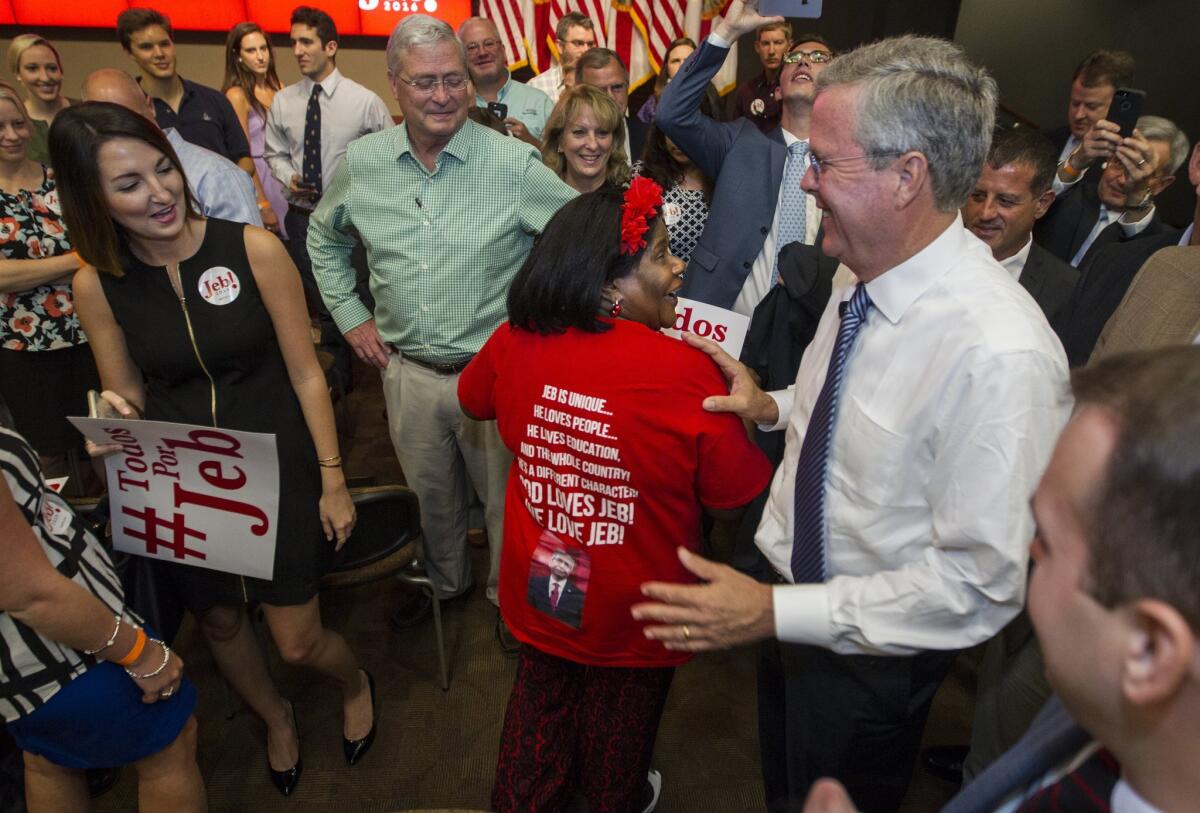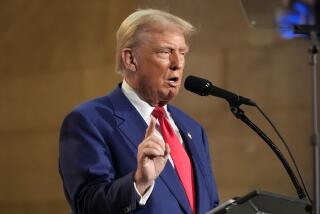Bush and Clinton highlight sharp contrast in dueling policy speeches

Republican presidential candidate and former Florida Gov. Jeb Bush laughs at a supporterâs shirt after delivering a speech on government reform in Tallahassee, Fla., on July 20.
Reporting from Washington â Jeb Bush pledged to cut government spending by reforming the âculture in our nationâs capitalâ in a speech Monday that hit themes long popular with conservative voters, including a balanced-budget amendment to the Constitution and a freeze in pay for many government workers.
The speech drew a sharp contrast in tone and content with Hillary Rodham Clinton, the Democratic front-runner, who has begun rolling out a series of policy proposals, many of which would involve expanding governmentâs role.
Clinton, in a speech a week ago outlining her economic ideas, called for what she termed a âgrowth and fairness economy,â one in which she would harness the power of the federal government in an effort to âraise incomes for hardworking Americans so they can afford a middle-class life.â She criticized âarbitrary growth targets untethered to peopleâs lives and livelihoods,â an implicit censure of Bushâs pledge that the economy would grow at a rate of 4% under his presidency.
Bush, by contrast, made clear that he sees government as the problem and economic growth as the measure of success.
âWeâve learned by now that you can have a fast-expanding economy or you can have a fast-expanding government, but you canât have both,â he said in his speech in Tallahassee, where he served as Floridaâs governor for eight years. âYou have to choose.
âFor anyone who wants to see a federal government even bigger, even farther removed from those it is supposed to serve, the other party will be offering that option,â Bush said. âIt will not be my intention to preside over the establishment, but in every way I know to disrupt that establishment and make it accountable to the people.â
Bushâs call to change the nature of Washington seemed designed to reassert his conservative credentials in a GOP primary race in which he faces several candidates to his right. But it also struck a potentially discordant note, given that the government he criticized for its âhabitual practice of deficit spendingâ was headed by his brother President George W. Bush for eight years, and during that time the post President-Clinton federal budget surplus ended and deficit spending returned.
Jeb Bushâs pledge to âturn off the automatic switch on discretionary spending increasesâ also struck an odd note. That category of spending, which covers federal spending governed by annual appropriations bills, has been shrinking as a share of the budget. Bush said that he would propose ideas later for the entitlement programs, such as Social Security and Medicare, that account for most of the long-term growth in federal spending.
Many of Bushâs ideas were longtime conservative staples, including the balanced-budget amendment, a line-item veto that would allow a president to strike specific items from spending bills, a 10% reduction in the size of the federal workforce over the first five years of his presidency, and moves to freeze the pay of many government workers and make them easier to fire.
But he included a new idea likely to meet strong resistance from many Republicans and Democrats in Congress: He would push for a six-year ban on any member of Congress becoming a lobbyist.
Under Bushâs plan, the definition of âlobbyingâ would be expanded to cover âthe ambiguous class of consultants who lobby but call it something else.â His plan, if Congress were to adopt it, would cut off a lucrative path that many senior members from both parties have followed into the private sector.
Bush also proposed cutting off the pay of members of Congress who donât show up for votes. The idea came with an unspoken, but unmistakable, subtext: His rivals for the nomination include four sitting senators who, as a group, have missed dozens of roll calls while out campaigning.
For more on politics and policy, follow @DavidLauter.
More to Read
Sign up for Essential California
The most important California stories and recommendations in your inbox every morning.
You may occasionally receive promotional content from the Los Angeles Times.











